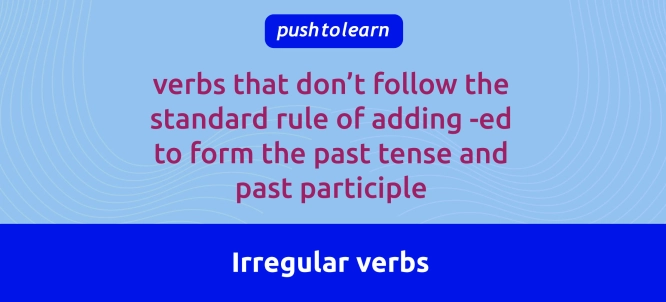by PushtoLearn
Irregular Verbs
Table of Contents
Irregular Verbs - Exercises
These exercises test different forms of IRREGULAR VERBS
Regular vs. Irregular Verbs
|
Type |
Example |
|
Regular Verb |
Present: walk → Past: walked → Past Participle: walked |
|
Irregular Verb |
Present: go → Past: went → Past Participle: gone |

List of Common Irregular Verbs
Here is a table of frequently used irregular verbs with their present, past, and past participle forms:
|
Base Form (Present) |
Past Tense |
Past Participle |
Example Sentence |
|
Arise |
Arose |
Arisen |
"She arose early in the morning." |
|
Awake |
Awoke |
Awoken |
"He has awoken feeling refreshed." |
|
Be |
Was/Were |
Been |
"I have been to London before." |
|
Bear |
Bore |
Borne/Born |
"She has borne the pain bravely." |
|
Beat |
Beat |
Beaten |
"They have beaten the other team." |
|
Become |
Became |
Become |
"He has become a famous artist." |
|
Begin |
Began |
Begun |
"The movie has just begun." |
|
Bend |
Bent |
Bent |
"He bent the wire into a circle." |
|
Bet |
Bet |
Bet |
"She bet all her money on the race." |
|
Bind |
Bound |
Bound |
"He bound the books with string." |
|
Bit |
Bitten |
"The dog has bitten the mailman." |
|
|
Bleed |
Bled |
Bled |
"He bled after cutting his hand." |
|
Blow |
Blew |
Blown |
"The wind has blown the leaves away." |
|
Break |
Broke |
Broken |
"The vase was accidentally broken." |
|
Breed |
Bred |
Bred |
"The rabbits were bred for research." |
|
Brought |
Brought |
"She has brought a cake to the party." |
|
|
Build |
Built |
Built |
"They built the house in just three months." |
|
Burn |
Burnt/Burned |
Burnt/Burned |
"He has burned all the old papers." |
|
Burst |
Burst |
Burst |
"The pipe burst in the cold weather." |
|
Buy |
Bought |
Bought |
"They bought a new car last month." |
|
Catch |
Caught |
Caught |
"She caught a cold after walking in the rain." |
|
Choose |
Chose |
Chosen |
"He has chosen the blue jacket." |
|
Come |
Came |
Come |
"She has already come home." |
|
Cost |
Cost |
Cost |
"The dress cost too much money." |
|
Cut |
Cut |
Cut |
"He cut the paper into small pieces." |
|
Deal |
Dealt |
Dealt |
"He dealt with the problem effectively." |
|
Dig |
Dug |
Dug |
"They dug a hole for the new tree." |
|
Do |
Did |
Done |
"I have done my homework." |
|
Draw |
Drew |
Drawn |
"She has drawn a beautiful picture." |
|
Dream |
Dreamed/Dreamt |
Dreamed/Dreamt |
"He dreamt about flying last night." |
|
Drink |
Drank |
Drunk |
"She has drunk all the juice." |
|
Drove |
Driven |
"I have driven this route many times." |
|
|
Eat |
Ate |
Eaten |
"He has eaten the entire cake." |
|
Fall |
Fell |
Fallen |
"The apples have fallen from the tree." |
|
Feel |
Felt |
Felt |
"She felt cold in the winter air." |
|
Fight |
Fought |
Fought |
"They fought bravely in the battle." |
|
Find |
Found |
Found |
"I found my missing keys under the sofa." |
|
Fly |
Flew |
Flown |
"The bird has flown away." |
|
Forget |
Forgot |
Forgotten |
"I have forgotten her name again!" |
|
Forgive |
Forgave |
Forgiven |
"He has forgiven her mistakes." |
|
Freeze |
Froze |
Frozen |
"The lake has frozen over." |
|
Get |
Got |
Gotten/Got |
"I have gotten a new job." |
|
Give |
Gave |
Given |
"She has given him a gift." |
|
Go |
Went |
Gone |
"He has gone to the market." |
|
Grow |
Grew |
Grown |
"The plant has grown taller overnight." |
|
Hang |
Hung |
Hung |
"He hung the painting on the wall." |
|
Have |
Had |
Had |
"She has had a busy day." |
|
Hear |
Heard |
Heard |
"I heard a strange noise last night." |
|
Hide |
Hid |
Hidden |
"He has hidden the treasure well." |
|
Hold |
Held |
Held |
"She held her baby tightly." |
|
Keep |
Kept |
Kept |
"He has kept his promise." |
|
Know |
Knew |
Known |
"She has known him for years." |
|
Leave |
Left |
Left |
"They left early for the meeting." |
|
Lose |
Lost |
Lost |
"I lost my phone yesterday." |
|
Make |
Made |
Made |
"She made a cake for the party." |
|
Mean |
Meant |
Meant |
"I meant no harm." |
|
Meet |
Met |
Met |
"I met her at the conference." |
|
Pay |
Paid |
Paid |
"He paid for the meal." |
|
Ride |
Rode |
Ridden |
"She has ridden a horse before." |
|
Ring |
Rang |
Rung |
"The phone has rung twice already." |
|
Say |
Said |
Said |
"She said hello to everyone." |
|
See |
Saw |
Seen |
"I have seen that movie." |
|
Sell |
Sold |
Sold |
"He sold his car last week." |
|
Send |
Sent |
Sent |
"She sent the email yesterday." |
|
Speak |
Spoke |
Spoken |
"He has spoken to the manager." |
|
Take |
Took |
Taken |
"She has taken her lunch." |
|
Teach |
Taught |
Taught |
"He taught them how to swim." |
|
Tell |
Told |
Told |
"She told me a funny story." |
|
Think |
Thought |
Thought |
"I thought about you yesterday." |
|
Write |
Wrote |
Written |
"She has written a new book." |
Rules for Learning Irregular Verbs
-
No Fixed Rules: Irregular verbs must be memorized because they don’t follow a consistent pattern.
-
Focus on Common Verbs: Start with the most frequently used irregular verbs, such as be, go, come, do, say, have.
-
Group by Patterns: Some irregular verbs share similarities in how they change. For example:
-
Verbs that stay the same: Cut – Cut – Cut
-
Verbs with identical past tense and past participle: Buy – Bought – Bought
-
Verbs that change completely: Go – Went – Gone
FAQ About Irregular Verbs
Why are some verbs irregular?
Irregular verbs are remnants of older English forms that didn’t follow modern regularization rules. Their unique forms have persisted over time.
Are all irregular verbs different in the past tense and past participle?
No, some irregular verbs have the same past tense and past participle forms (e.g., buy – bought – bought), while others stay the same in all forms (e.g., cut – cut – cut).
Can irregular verbs ever become regular?
Yes, over time, some verbs have become regular. For example, the past tense of "help" used to be "holp" but is now "helped."
Is there a trick to learning irregular verbs?
Grouping verbs with similar patterns, practicing with flashcards, and using them in sentences can help you remember them more easily.
Are irregular verbs used more often than regular verbs?
Yes, many of the most common verbs in English, like be, go, have, say, and do, are irregular, making them essential to learn.

